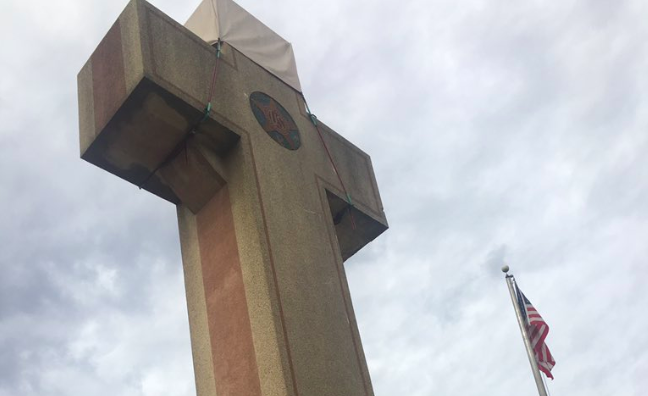An atheist group’s attempt to remove a cross-shaped World War I monument in Maryland has garnered backlash from service members who view the case as an attack on American values and those who have died defending them.
The nearly 100-year-old Peace Cross, constructed between 1919 and 1925, faces potential demolition, pending a ruling from the Supreme Court, The Daily Signal reported.
Peace Cross in Bladensburg went up in 1925 to honor the soldiers from Prince George's County killed in the "War to end war" 100 years ago. The Supreme Court will now decide whether it can remain or as a religious symbol must be taken down. @ABC7News at 4. #VeteransDay18 pic.twitter.com/9v1qbYi32x
— Brad Bell (@Brad7News) November 12, 2018
This WWI Anniversary Could Be The Last For The Bladensburg Cross https://t.co/2STyAW5tZb
— Mollie (@MZHemingway) November 10, 2018
The controversy began in 2014, when the American Humanist Association filed a lawsuit to have the public memorial honoring 49 men from Prince George’s County, Maryland, who died serving in World War I, removed.
According to the secular group, taxpayer-funded government maintenance of the cross-shaped monument violates the First Amendment by promoting the religion of Christianity.
Living Liver Donor Says Experience Inspired Her to Become Transplant Surgeon
A lower court initially ruled against the American Humanist Association, siding with the Park and Planning Commission and the American Legion, America’s largest veterans service association, which originally funded the monument. But in 2017, a three-judge panel of the 4th U.S. Circuit Court of Appeals determined in a 2-1 decision that the structure was unconstitutional.
“It [the cross] is 40 feet tall; prominently displayed in the center of one of the busiest intersections in Prince George’s County, Maryland; and maintained with thousands of dollars in government funds,” Judge Stephanie D. Thacker wrote, as reported by The Daily Signal. “Therefore, we hold that the purported war memorial breaches the ‘wall of separation between Church and State.’”
But the defendants maintain that the monument was erected for the purpose of honoring the brave men who made the ultimate sacrifice. It’s primary message, they argue, is patriotic, not religious.
Earlier this month, the Supreme Court agreed to rule on the case.
In the meantime, American veterans have weighed in — and they’re not pleased.
“Americans of all faith backgrounds should be outraged,” Jake Hill, a lance corporal in the Marine Corps, told The Daily Signal.
“Where will this end? Will they begin chiseling the crosses and stars of David off gravestones in Arlington [National Cemetery] next?” he added.
“I think it’s a reach to say that this is a First Amendment violation of the separation of church and state,” Mike Moore, a 73-year-old Army veteran from Lanham, Maryland, told The Daily Signal.
“There are lots of things in the form of a cross which are not necessarily expressions of religion,” he added. “There’s all kinds of servicemen’s medals in the form of the cross that have no religious connotation to them.”
Phillip F. Wright, an Army veteran who serves as executive director of the Chaplain Alliance for Religious Liberty, had some strong words for the American Humanist Association and others who claim to be “offended” by the historic monument.
“They don’t have to buy [anything], they don’t have to listen at these places that offend them,” Wright said, adding, “They can go to their ‘safe places’ and think what they want to think.”
“Their position is one of outright hostility to religious faith in this country,” he said. “It ignores the history of this country, it ignores the brave things service members have done and ought to be remembered for.”
Wright added that, if taken to the extreme, logic used by groups like the American Humanist Association “prevents freedom of expression and other rights of the First Amendment.”
Fortunately, he noted, these rights “are defended” by the Constitution, as he hopes the Supreme Court ruling will reveal.
In a news release announcing the latest development in the Peace Cross case, American Center for Law & Justice attorney Geoffrey Surtees offered a constitutional defense of the memorial:
The Establishment Clause was originally adopted—as the very word “establish” obviously suggests—to prohibit the government from establishing a religion as the official religion of the country. Using a cross to honor the lives of 49 World War I soldiers from the local community is hardly tantamount to establishing Christianity as the official religion of Prince George’s County, Maryland. The kind of religious establishment prohibited by the First Amendment entails (among other things) coercing individuals to support or participate in religious practices—or punishing them for failing to do so. The Peace Cross clearly does nothing of the sort.
House Majority Whip Scalise (R-La.), who helped organize a brief from members of Congress who support the public war memorial, was a leading force behind the effort to get the highest court to settle the dispute.
In a statement published by the Family Research Council, the congressman explained how this case represents what is at “the heart of religious freedom attacks.”
“This is such an important case, and [the FRC] were at the forefront of it as well in recognizing that if they take down Bladensburg, they’re going after Arlington [Cemetery]. They’re going after every marker on public land that has some kind of religious symbol — whether it’s the cross or Star of David. This is how people want to be remembered in their death, especially if they sacrificed their lives for our country. To think that a court decision could take that ability away… I’m so glad that Justice Kavanaugh is on the bench to participate in this case, along with Neil Gorsuch, because it means President Trump will definitely have a lasting imprint on this decision — and hopefully, it’s the right decision.”
Sunday marked 100 years since the armistice that ended World War I. The Supreme Court’s decision regarding the Bladensburg Peace Cross has the potential to affect the way these brave war heroes are remembered for generations to come.



